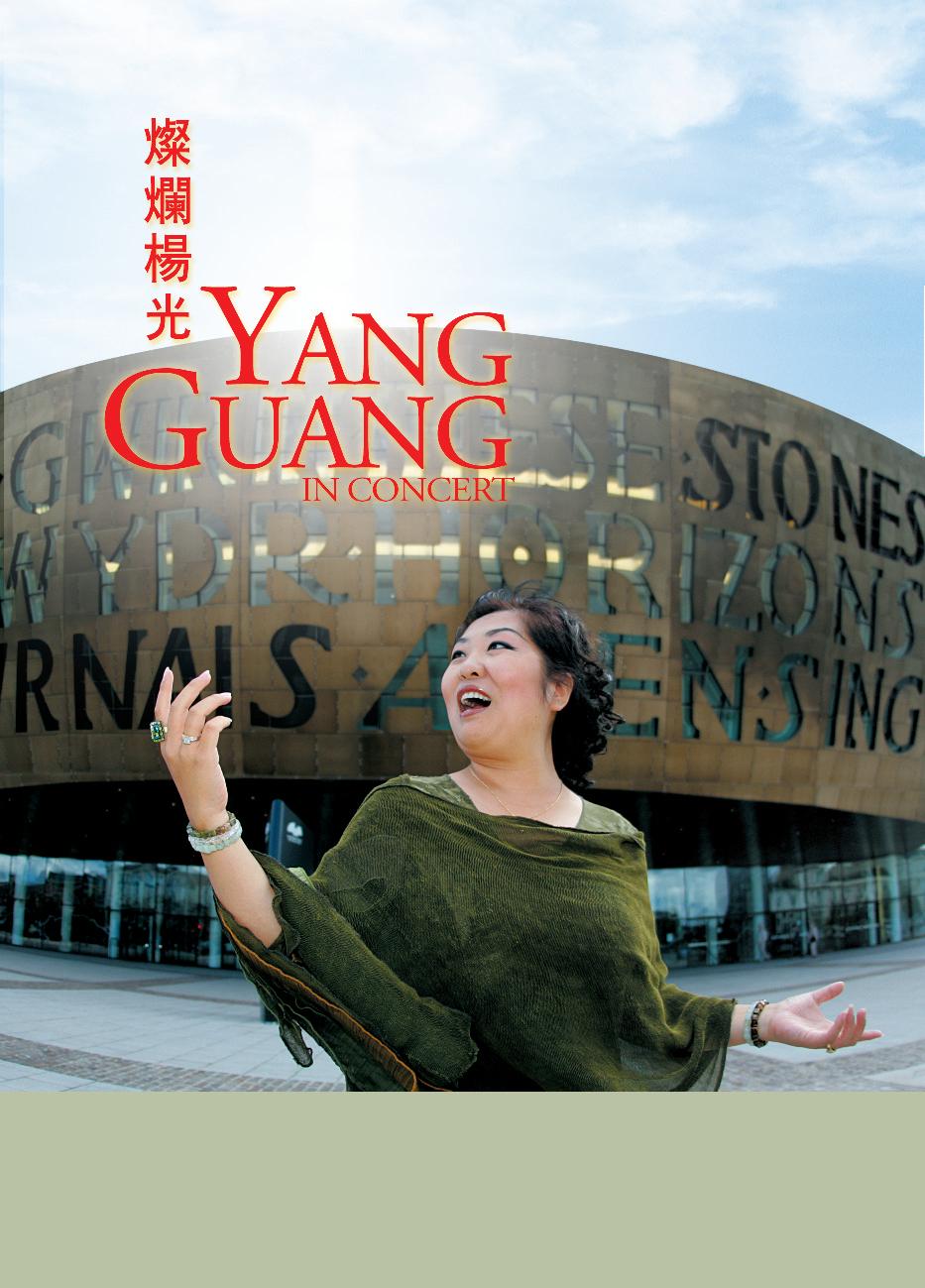
謝謝 With thanks to
香港大會堂音樂廳
Concert Hall
Hong Kong City Hall
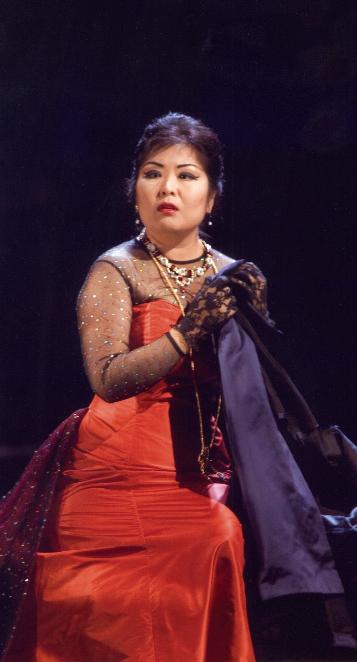


謝謝 With thanks to
香港大會堂音樂廳
Concert Hall
Hong Kong City Hall

演出長約1 小時15 分鐘,包括一節中場休息
Running time: approximately 1 hour and 15 minutes with one interval
指揮 張國勇
Conductor Zhang Guoyong
樂團 上海歌劇院交響樂團 Orchestra Shanghai Opera House Orchestra
楊光 Yang Guang
樂團成員 Orchestra Members 8
訪問
An Interview with Yang Guang 指揮簡歷
Conductor’s Biography
樂團介紹 Orchestra Profile
曲目 Programme
歌詞 Lyrics
為了讓大家對這次演出留下美好印象,請切記在節目開始 前關掉手錶、無㵟電話及傳呼機的響鬧裝置。會場內請勿 擅自攝影、錄音或錄影,亦不可飲食和吸煙,多謝合作。
To make this performance a pleasant experience for the artists and other members of the audience, PLEASE switch off your alarm watches, MOBILE PHONES and PAGERS. Eating and drinking, unauthorised photography and audio or video recording are forbidden in the auditorium. Thank you for your co-operation.
女中音 Mezzo-soprano
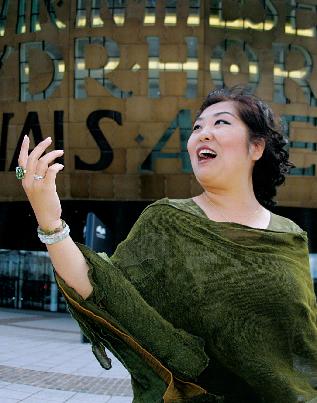
光是當今最傑出的戲劇花腔女中音歌唱 家之一,生於北京, 1996 年畢業於中 央音樂學院聲樂系,師從陳瑜教授及蔣 英教授,以第一名成績畢業並留校任教。同年獲 第21屆巴黎國際聲樂比賽女子組第一名和日本靜 岡國際歌劇比賽決賽獎, 1997 年於英國卡迪夫
BBC世界歌唱家大賽奪冠,成為首位贏取這獎項 的華人,並榮獲「BBC 世界歌唱家」稱號。
The 1997 winner of the prestigious BBC Singer of the World Competition in Cardiff, Yang Guang recently completed a threeyear stay at the Lyric Opera of Chicago’s Center for American Artists. Her repertoire at the Lyric Opera included Flosshilde in Das Rheingold, Grimgerde in Die Walküre and the second Norn in Götterdämmerung.
英國《泰晤士報》評價「女中音歌唱家楊 光,聲音渾圓飽滿、乾淨漂亮,中聲區 有如清鐘震耳,高音嘹亮輝煌,具有勢 不可擋的穿透力,表現出非凡的聲樂天 賦,聽眾讚歎不已。」
1998 年她以全額獎學金進入紐約茱莉 亞音樂學院歌劇中心深造,師從聲樂大 師瑪麗蓮.霍恩,並取得藝術家證書。
2001 年,楊光在華盛頓摘下杜鳴高 Operalia 世界歌唱比賽的桂冠, 美國 《華盛頓郵報》評論:「女中音楊光如天 鵝絨般的柔美低音,和金子般燦爛的高 音,儼然是一位東方的霍恩。她的歌聲 成為這次比賽中最具魅力的聲音」。
2001 年11 月,楊光於台北第三屆世界 華人歌唱比賽囊括大獎、最佳歌劇詮釋 獎和最佳外國藝術歌曲獎。
楊光曾合作的歌劇院有芝加哥歌劇院、
休斯頓歌劇院、柏林德意志歌劇院、加 拿大歌劇院、威爾斯國立歌劇院、里昂 歌劇院、達拉斯歌劇院,演出劇目有
《卡門》、《唐卡洛》、《阿依達》、《蝴蝶 夫人》、《鄉村騎士》、《修女的對話》、 威爾第的《安魂曲》、《塞維利亞的理髮 師》等。曾合作的樂隊有芝加哥交響樂 團、美國國家交響樂團、倫敦交響樂 團、英國愛樂樂團、中國國家交響樂 團、巴黎交響樂團,以及瑞典廣播交響 樂團等。
Yang’s current season has included a return to the Canadian Opera Company, where she appeared in Die Walküre and Götterdämmerung in their complete Ring Cycle. She also made her Florida Grand Opera debut as Amneris in Aida. She will make her Paris debut in a concert of Verdi’s Requiem with Christoph Eschenbach and the Orchestre de Paris, and after that in Houston for more performances of Aida. In the future, she will return for engagements to the Lyric Opera of Chicago, the Canadian Opera Company and the Deutsche Oper Berlin, all in leading roles.
Yang’s recent projects included her return to the Welsh National Opera for her first Eboli in Don Carlos (in the original French 5-act version), a role she will reprise for the Canadian Opera Company in the 2007/08 season. She also debuted as Santuzza in Cavalleria rusticana at the Deutsche Oper Berlin.
In concert, Yang made her Chicago Symphony debut as the alto solo in Tippett’s A Child of Our Time under Sir Andrew Davis and performed in recital at the Chicago Cultural Center. Other concert engagements have included her Carnegie Hall debut in a gala performance for the Marilyn Horne Foundation, the Verdi Requiem with the National Symphony Orchestra in the summer of 2002, a recital tour to the UK, and appearances with the Philharmonia Orchestra, London Symphony Orchestra, China National Symphony Orchestra, Orchestre de Paris and the Stockholm Radio Symphony Orchestra.
Yang Guang was born in Beijing, where she studied at the Central Conservatory of Music. In 2001 she won First Prize in Operalia – Plácido Domingo’s World Opera Competition.
港龍航空為楊光、指揮張國勇及樂團成員提供航空服務
Yang Guang, Zhang Guoyong and members of the Orchestra are flown in by
今日的楊光被認為是這一代歌劇演 員,特別是中國聲樂界中,最有代表 性的女中音歌唱家,這幾年,她的歌 唱成就已被國際歌劇界同行肯定,轉 捩點便是 1997 年,她成為迄今仍是 惟一贏得卡迪夫大賽桂冠的華人歌唱 家。
她說:「我當年是聲樂歌劇系中最好
的學生,在此之前已在法國巴黎、日 本靜岡的國際比賽取得冠軍,但卡迪 夫那次比賽才讓我知道外邊的真實世
界,那次獲獎後合約很多,在半年內 東奔西跑。當年我獲獎,在中國引起 很大哄動,算是成名了,有人認為我 留在國內會有很多機會,會賺很多 錢,但後來卻發現我很少演出,在舞 台上消失了;幾年下來,在中國很多 人更已將我忘記了。」
真相是楊光很清楚知道自己的條件和 能力,她說:「我清楚知道我在歌唱 上的基礎訓練,全在國內完成,會有 局限,缺乏深懂外語的藝術指導,發 音不是很準確,所以在 1998 年 1 月我 決定出國,拿了全數獎學金進了紐約 茱莉亞音樂學院歌劇中心深造了三 年,獲得瑪麗蓮.霍恩悉心指導,有
文:周凡夫 by Chow Fan-fu
Today, Yang Guang is well recognised among the present generation of opera stars, especially in the music world in China, as THE mezzo-soprano. In the past few years, the international world of opera has confirmed her status. The turning point came in 1997 when she became the only Chinese singer to date to win the BBC Singer of the World Competition in Cardiff, Wales.
She said: “At the time, I had been considered the best student in the Department of Vocal Studies at the conservatory, and I had already won international singing competitions in Paris and in Shizuoka, Japan. But the Cardiff competition was the one that allowed me to know what the real world was like. When I won at Cardiff, it brought me so many engagements that for six months I was just rushing from here to there. The prize caused a great uproar in China; I had made my name. Some people felt that if I stayed in China, there would be a great many opportunities for me and I could make a lot of money. As it turned out, I left China. I hardly performed on the stages of China at all, and within a few years, I was all but forgotten there.”
The truth was that Yang Guang was very clear-eyed about her talents and her abilities. “I received my basic voice training in China and this had its limitations. I lacked artistic guidance in understanding foreign languages and my pronunciation was not accurate. So, in January 1998, I decided to go abroad. I received a full scholarship to attend the Juilliard School of Music in New York for three years.
很多機會演出不同的歌劇,訓練我從 生手變成熟手,再打下很好的基石,
那幾年間在國內便沒有演出,有人為 我可惜,認為我浪費了很多機會,其 實更重要的是我可以百分百專注學 習,那是對生活價值理解不同,我覺 得很值得。」
唱好歌有如駕駛汽車
經過新的磨鍊後,楊光於 2001 年在 華盛頓杜鳴高世界歌唱大賽勝出,更 囊括台北第三屆世界華人歌唱大賽三 大獎項。此後,在歐美各大歌劇院登 台演出的歌劇,和大樂團的合作,她 的歌聲都征服了各地樂迷,具有不可 擋的「魔力」一樣。
箇中可有秘訣?剛於美國演出完畢, 回到北京來的楊光,用帶着陽光的爽 朗笑聲回答這個問題:「我個人覺得 一方面是技術上,另一方面是性格 上。我清楚知道,技術上不過關一定 不行,聲音狀態、呼吸、共鳴,對語 言的訓練,語言的準確性都很重要, 我唱非我自己母語的歌劇,較美國人 更強調口音的準確,要做到沒有口 音,最少是將口音的差距減到最少, 因為要能唱出韻味,那絕對是語言上 的口音問題。
「出國後我對語言有更深的了解,其重 要性在於它與演唱時的感情表達有 關,那就像駕駛汽車一樣,只有清楚 了解樂段的長短,語音的特色,才會 有意念,才會知道怎樣去將歌曲中的 感情表達,在感情上便會有準備,有 培養,駕駛汽車要轉彎也好、要加速 也好,都是先有意念,作出應有的準 備,減油或加油,然後轉彎或加速, 這才會順暢。
There I had intense training under Marilyn Horne and had many opportunities to sing in different operas. I was transformed from a fledgling singer into an experienced professional, and a fine foundation was laid. In those few years, I did not perform in China. Some people thought it was a shame; they thought I had missed many opportunities. Actually, being able to spend 100 percent of my time concentrating on learning was more important to me. It was just a difference of opinion over life values. I felt what I did was very much worthwhile.”
After honing herself in this way, in 2001, Yang Guang won Plácido Domingo’s World Opera Competition Operalia in Washington, DC, and three prizes at the 3rd World Chinese Vocalists Competition in Taipei. She then sang in operas and with orchestras throughout Europe and North America. Her voice, with its seemingly magical allure, conquered many along the way.
What was her secret? Yang Guang, who recently returned to Beijing from performances in the US, answered the question with a laugh: “I personally think that it is partly technique and partly personality. I knew very well that without technique, it wouldn’t work. The condition of the voice, breath control, resonance, language training, accurate pronunciation - all these are very important. I am not singing operas in my native Chinese language and it was important for me to produce sounds that are more accurate and flawless than, say, an American would, or at least to reduce flawed pronunciations to the minimum. To be able to bring out the appeal of the words with correct pronunciation is vastly important.
“After I went abroad, I gained a deeper understanding of the importance of language, which after all, connects with the expression of feelings. It’s like driving a car. Only by being very clear about the phrasing and the special characteristics of the language will the concept behind the music be instilled in your mind to allow the emotion to shine through. When you’re driving, if you want to make a turn or increase speed, the idea of doing so first comes to your mind and then you make the appropriate preparations, such as stepping on the gas pedal or turning the steering wheel,
「至於性格上,則在於很多人認為舞台 上演戲是假的,我卻認為舞台是能讓 我展示自己真實一面的平台、空間, 是我個人個性真實的呈現,我個人總 認為表面的形式可以模仿,但內心情 感卻很難;我在台上演出時的情感便 很個人的,非模仿的,往往能讓人感 到舞台上的演出很真實,那才會感動 人,才會讓人產生共鳴。」
十年後是我的黃金期 這次香港藝術節音樂會特別請來上海 歌劇院交響樂團,由院長張國勇執棒 伴奏,選唱的全是歌劇中的詠嘆調, 涵蓋了韓德爾、莫扎特,到威爾第、
比才,幾乎包羅了歌劇世界中最具代 表性的女中音詠嘆調,惟一欠缺的是 華格納的作品。
1970 年在北京出生的楊光以開朗且坦 率的語氣說:「這完全是因為一場音 樂會的時間有限制,現在這套曲目已
很有份量,我唱華格納的歌曲技巧上 完全沒有問題,但華格納的音樂確實 是太重了,很易會影響花腔的演唱,
作為一位女中音,十年後是我的黃金 期,這十年我要好好地唱下去;作為 一個東方人,在西方競爭激烈的環境 况,我要加倍努力才能和人家競爭。
而且,這才是我第一次在香港的獨唱 會啊!」
周凡夫, 香港資深樂評人,香港電台 藝評節目主持。
before you put the thought into action. This, then, enables the action to be accomplished smoothly.
“As for personality, many people feel that acting on the stage is just acting. But I feel that the stage allows me a platform and space to show my true aspect, a part of me that is really me. I personally feel that superficial aspects can be imitated, but inner emotions cannot. The feelings I show on stage are personal ones. It’s not acting. If you can make people feel that what is happening on stage is real, then you can touch them and strike a sympathetic chord with them.”
For Yang Guang’s concert, the Festival has invited the Orchestra of the Shanghai Opera House, under the baton of its Director Zhang Guoyong, to accompany her. The programme will include a number of arias from operas by Handel, Mozart, Verdi, Bizet ... in fact, almost all of the most representative of the mezzo-soprano operatic repertory. Just about the only composer missing is Wagner.
Yang Guang, who was born in Beijing in 1970, spoke frankly and to the point: “It’s only because time is limited in just a single concert. The music selected is already quite comprehensive. I don’t have any problem singing Wagner, but his music is truly weighty and singing it can easily affect the voice.
“As a mezzo-soprano, I should reach my golden era in ten years’ time. In these ten years, I want to choose well. As an Asian, I need to work doubly hard to compete with others in the western world of opera. Besides, this is just my first concert in Hong Kong!”
Chow Fan-fu is a music critic and also hosts an arts review programme for RTHK.
Translated by Pan Shih *
* 時學班女士於 2007 年 2 月 3 日辭世,香港藝術節謹此誌念。
Pan Shih passed away on 3 February 2007. The Festival remembers her with great fondness and appreciation .
指揮 Conductor
1983年於上海音樂學院指揮系畢業,1997年在莫斯科國 立柴可夫斯基音樂學院取得音樂博士學位。先後師從著 名指揮家、音樂教育家黃曉同教授和國際著名指揮大師 羅傑司特汶斯基。現任上海歌劇院院長兼藝術總監,上 海音樂學院作曲指揮系教授,上海交響樂團常任指揮。
他曾先後與國內外著名歌劇院及交響樂團合作,指揮一 系列經典作品,如歌劇《弄臣》、《蝴蝶夫人》、《茶花女》; 芭蕾舞劇《胡桃夾子》、《天鵝湖》、《唐.吉訶德》;交響合 唱《森林之歌》,以及《黃河大合唱》等。
在莫斯科深造期間,張國勇曾指揮多個著名俄羅斯樂 團,並錄製唱片。指揮大師羅傑司特汶斯基給他很高的 評價:「我給張國勇莫斯科音樂學院指揮系有史以來最高 的分數,他可以勝任世界上任何一個樂團的指揮。」
近年他活躍國際音樂舞台,足跡遍及美國、法國、德 國、瑞士、俄羅斯、韓國、日本、香港、澳門、台灣等 國家和地區。
2006年,張國勇應邀擔任第八屆西班牙卡達喀斯交響樂 團國際指揮大賽評委。
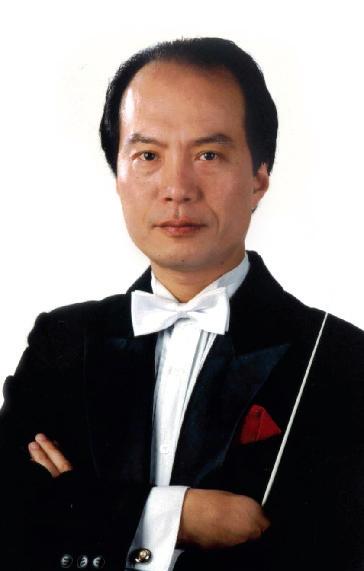
Zhang Guoyong studied conducting at the Shanghai Conservatory of Music under the direction of Professor Huang Xiaotong. In 1997, he obtained his PhD at the Moscow State Conservatory, where he studied under Gennadi Rozhdestvensky.
During his studies in Moscow he conducted and produced CD recordings with many important Russian orchestras. At his graduation Rozhdestvensky said of Zhang: “I am awarding Zhang Guoyong the highest mark in the history of the conducting department at the Moscow Conservatory. He can most assuredly take his place in any orchestra throughout the world.”
Zhang is currently a professor at the Shanghai Conservatory of Music, President and Artistic Director of the Shanghai Opera House, and Resident Conductor of the Shanghai Symphony Orchestra.
Apart from his symphonic repertoire, he has also conducted the operas Rigoletto, Madama Butterfly and La traviata; the ballets The Nutcracker, Swan Lake and Don Quixote; and cantatas Song of the Forest and Yellow River Cantata, among other works. In recent years, Zhang Guoyong has been invited to conduct concerts in the US, France, Germany, Switzerland, Russia, Korea, Japan, Hong Kong, Macau and Taiwan.
In 2006, Zhang was invited to be a member of the jury of the 8th Cadaques Orchestra International Conducting Competition in Spain.

上海歌劇院交響樂團
上海歌劇院交響樂團是由 1950 年代初成立的上海歌劇舞劇院交響樂團和上海樂 團的演奏家組成。中國著名的音樂表演團體之一。
四十多年來,樂團演出了國內外眾多作曲家不同時期、不同風格的音樂 作品, 同時與世界許多著名的指揮家和演奏家合作。遍演世界著名歌劇和中國 歌劇, 如《白毛女》、《江姐》、《洪湖赤衛隊》、《楚霸王》等,以及芭蕾舞劇《白毛女》、 《胡桃夾子》、《天鵝湖》等。2005 年12 月,樂團為國際三大男高音之一的巴伐洛 堤之全球告別巡演(上海站)擔任伴奏,廣受好評。
樂團為電台、電視台、唱片公司、音像公司錄音及錄影,其交響合唱《黃河》更 榮獲「金唱片獎」。
樂團的演奏家多次應邀出訪亞、歐、美洲等地,曾於前蘇聯列寧格勒、 亞洲新 加坡、香港及澳門的藝術節演出。
Founded in the early 1950s, the Orchestra of the Shanghai Opera House is comprised of musicians from the Shanghai Opera and Dance Company, and the Shanghai Philharmonic Orchestra.
As one of the most established large music ensembles in China, the Orchestra has performed works from many different periods and styles as w ell as collaborated with outstanding conductors and soloists. Among its repertoire the Orchestra has performed well known western works including the ballets Swan Lake and The Nutcracker, as well as Chinese operas such as The Savage Land and The King of Chu. The Orchestra also accompanied Pavarotti when he sang in Shanghai in December 2005, as part of his inter national ‘Farewell Tour’.
The Orchestra has toured to Europe, Russia and the US and performed in music festivals in Singapore, Hong Kong and Macau.
羅西尼 (1792-1868)
序曲
我聽到一縷歌聲
選自《塞維利亞的理髮師》
韓德爾 (1685-1759)
甜美的樹蔭
選自《塞爾斯》
莫扎特 (1756-1791)
我該何去何從
我將離去,但親愛的
選自《狄托的仁慈》
聖桑 (1835-1921)
你的聲音開啟我的心扉
選自《參孫與達利拉》
-中場休息-
馬斯卡尼 (1863-1945)
間奏交響曲
啊,你知道嗎,媽媽?
選自《鄉村騎士》
安布魯斯.湯瑪士 (1811-1896)
君知南國否
選自《梅娘》
威爾第 (1813-1901)
啊,我的命運
選自《唐.卡洛斯》
比才 (1838-1875)
哈巴內拉舞曲
選自《卡門》
Gioacchino Rossini (1792-1868)
Overture
Una voce poco fa from Il barbiere di Siviglia
George Frideric Handel (1685-1759)
Ombra mai fu from Serse
Wolfgang Amadeus Mozart (1756-1791)
Vado ma dove?
Parto, ma tu ben mio from La clemenza di Tito
Camille Saint-Saëns (1835-1921)
Mon coeur s’ouvre à la voix from Samson et Dalila
– Interval –
Pietro Mascagni (1863-1945)
Intermezzo sinfonico
Voi lo sapete, o mamma from Cavalleria rusticana
Ambroise Thomas (1811-1896)
Connais-tu le pays from Mignon
Giuseppe Verdi (1813-1901)
O don fatale from Don Carlos
Georges Bizet (1838-1875)
Habanera from Carmen
Gioacchino Rossini
羅西尼
Una voce poco fa da Il barbiere di Siviglia
A voice has just echoed from The Barber of Seville
我聽到一縷歌聲
選自《塞維利亞的理髮師》
George Frideric Handel
韓德爾
Ombra mai fu da Serse
Never was shade from Serse
甜美的樹蔭
選自《塞爾斯》
Wolfgang Amadeus Mozart
莫扎特
Vado ma dove?
I go, but where, ye gods!
我該何去何從
Una voce poco fa qui nel cor mi risuonò; il mio cor ferito è già, e Lindor fu che il piagò.
Sì, Lindoro mio sarà; lo giurai, la vincerò. Il tutor ricuserà, io l’ingegno aguzzerò.
Alla fin s’accheterà e contenta io resterò.
Sì, Lindoro mio sarà; lo giurai, la vincerò.
Io sono docile, son rispettosa, sono obbediente, dolce, amorosa; mi lascio reggere, mi fo guidar.
Ma se mi toccano dov’è il mio debole sarò una vipera e cento trappole prima di cedere farò giocar.
Ombra mai fu di vegetabile, cara ed amabile, soave più.
Vado, ma dove? Oh Dei!
Se de’ tormenti suoi, se de’ tormenti miei non sente il ciel pietà!
Tu che mi parli al core, guida i miei passi, amore; tu quel ritegno or togli che dubitar mi fa.
A voice has just echoed here into my heart; my heart is already wounded and it was Lindoro who shot. Yes, Lindoro will be mine; I’ve sworn it, I’ll win. The tutor will refuse, I’ll sharpen my mind finally he’ll accept, and happily I’ll rest. Yes, Lindoro will be mine; I’ve sworn it, I’ll win. I’m gentle, respectful, I’m obedient, sweet, loving, I let be ruled, I let be guided. But if they touch where my weak spot is, I’ll be a viper and a hundred traps, before giving up I’ll make them fall.
Never was shade of dear and amiable vegetable more sweet.
I go, but where, ye gods! if his torments, and my sighs do not move heaven to pity? Love, you who speak to my heart, guide my steps, take away now the hesitation that makes me doubt.
一把聲音剛剛 在我心底迴響, 我的心已傷, 傷我心的是林多羅。 林多羅將屬於我, 我發誓我會如願以償。
這音樂教師會拒絕, 但我會更清醒更敏銳, 最終他會接受, 我將愜意快樂。
是的,林多羅將屬於我, 我發過誓,我定會如願以償。
我溫柔又恭敬, 我順從、甜蜜又可愛, 我可以受支配,我可以受指使, 但如果他們冒犯我,
我會變成蛇毒,設下一百個陷阱, 不叫他們全掉進去絕不罷休。
沒有什麼比 和藹可親的 植物的陰影 更心曠神怡。
我往哪况去呢,眾神啊 ! 如果他的折磨 和我的歎息 不能引起上天的垂憐? 愛情啊,你向我的心說話, 請你給我帶路, 消除我的猶豫, 使我再無疑慮。
Wolfgang Amadeus Mozart
莫扎特
Parto, ma tu ben mio
da La clemenza di Tito
I go, but, my dearest, from The Clemency of Titus 我將離去,但親愛的 選自《狄托的仁慈》
Camille Saint-Saëns
聖桑
Mon coeur s’ouvre à la voix from Samson et Dalila
My heart opens to your voice from Samson and Delilah
你的聲音開啟我的心扉 選自《參孫與達利拉》
Parto, ma tu ben mio, meco ritorna in pace; sarò qual più ti piace; quel che vorrai fatò.
Guardami, e tutto oblio, e a vendicarti io volo; a questo sguardo solo da me sì pensera. Ah qual poter, oh Dei! Donaste alla beltà.
Mon coeur s’ouvre à la voix, comme s’ouvrent les fleurs aux baiser de l’aurore!
Mais, ô mon bienaimé, pour mieux sécher mes pleurs, Que ta voix parle encore!
Dis-moi qu’à Dalila tu reviens pour jamais, redis à ma tendresse les serments d’autrefois, ces serments que j’aimais!
Ah! réponds à ma tendresse!
Verse-moi, verse-moi l’ivresse!
Ainsi qu’on voit des blés les épis onduler sous la brise légère, ainsi frémit mon coeur, prêt à se consoler, a ta voix qui m’est chère!
La flèche est moins rapide à porter le trépas, que ne l’est ton amante à voler dans tes bras!
Ah! réponds à ma tendresse!
Verse-moi, verse-moi l’ivresse!
– Interval –
I go, but, my dearest, make peace again with me; I will be what you would most have me be, do whatever you wish.
Look at me, and I will forget all and fly to avenge you; I will think only of that glance at me. Ah, ye gods, what power you have given beauty.
My heart opens to your voice, like the flowers open to the kisses of the dawn! But, o my beloved, to dry my tears the best, let your voice speak again! Tell me that to Delilah you will return forever; repeat to my tenderness the oaths of other times, the oaths that I loved! Ah! respond to my tenderness! Pour out to me the drunkeness!
Like one sees the wheat, the blades undulate under the light breeze, so trembles my heart, ready to be consoled, by your voice which is dear to me! The arrow is less quick to carry death, than is your love to fly into my arms! Ah! respond to my tenderness! Pour out to me the drunkeness!
我將離去,但是,我最親愛的 讓我們再次握手言和; 你要我怎樣我就怎樣, 我隨你擺佈。
望着我吧,這樣我將忘記一切 飛向你,報復你; 我將只想着 那道凝視我的目光。 神啊,你們賦予美 以怎樣的力量!
我的心向你的聲音開放 像鮮花向着 黎明的吻開放! 但是,我的心上人啊, 若要擦乾我的淚 最好是你再次開口說話! 請告訴我,你將永遠 回到達麗拉身邊, 請向我的柔情 重申往昔的誓言, 我所珍愛的誓言! 啊,回答我的柔情 ! 把醉意傾瀉給我!
像那田野上 麥葉在輕風下 微微波動, 我的心也這樣顫抖, 渴望得到你的聲音的安慰, 你那使我癡迷的聲音! 那致人於死地的飛箭, 它的速度 怎及得上你的愛 飛入我的懷抱! 啊,回答我的柔情 ! 把醉意傾瀉給我!
-中場休息-
Pietro Mascagni
馬斯卡尼
Voi lo sapete, o mamma da Cavalleria rusticana
You know, mama, from The Rustic Cavalier
啊,你知道嗎,媽媽?
選自《鄉村騎士》
Ambroise Thomas
安布魯斯.湯瑪士
Connais-tu le pays de Mignon
Knowest thou the country from Mignon
君知南國否
選自《梅娘》
Voi lo sapete, o mamma, prima d’andar soldato, Turiddu aveva a Lola eterna fè giurato.
Tornò, la seppe sposa; e con un nuovo amore volle spegner la fiamma che gli bruciava il core: M’amò, l’amai.
Quell’invidia d’ogni delizia mia del suo sposo dimentica, arse di gelosia... me l’ha rapito...
Priva dell’onor mio rimango: lola e Turiddu s’amano, Io piango, io piango!
Connais-tu le pays où fleurit l’oranger?
Le pays des fruits d’or et des roses vermeilles, où la brise est plus douce et l’oiseau plus léger, où dans toute saison butinent les abeilles, où rayonne et sourit, comme un bienfait de dieu, un éternel printemps sous un ciel toujours bleu! Hélas! Que ne puis-je te suivre vers ce rivage heureux d’où le sort m’exila! C’est là! c’est là que je voudrais vivre, aimer, aimer et mourir!
Connais-tu la maison où l’on m’attend là-bas? la salle aux lambris d’or, où des hommes de marbre
m’appellent dans la nuit en me tendant les bras?
Et la cour où l’on danse à l’ombre d’un grand arbre?
et le lac transparent où glissent sur les eaux mille bateaux légers pariels à des oiseaux! Hélas! Que ne puis-je te suivre vers ce pays lointain d’où le sort m’exila! C’est là! c’est là que je voudrais vivre, aimer, aimer et mourir!
You know, mama, that before he went off to be a soldier Turiddu swore to Lola to be eternally faithful. He returned to find her married; and with a new love he wanted to extinguish the flame that burnt in his heart: He loved me, I loved him. She, envious of my happiness, forgotten by her husband, burning with jealousy, she stole him from me.
I am left, dishonoured: Lola and Turiddu love each other, and I weep!
Knowest thou the land where the orange trees bloom?
The land of golden fruit and crimson roses, where the breeze blows softer and the birds fly higher, where the bees make honey all year round, and eternal springtime shines and smiles, like a gift from God, beneath a sky forever blue! Alas that I cannot follow thee to that happy shore whence fate has exiled me! It is there, only there, that I would wish to live, to love, and love, and at last to die!
Knowest thou the house where I am waited for?
The room with golden walls, where in the night men made of marble hold out their arms and call to me? The courtyard where you dance beneath the shade of a great tree?
And the clear lake where a thousand little boats skim like birds on the water? Alas that I cannot follow thee to that far land whence fate has exiled me! it is there, only there, that I would wish to live, to love, and love, and at last to die!
Translation by Natasha Rogai
你知道嗎,媽媽 圖里杜去當兵之前 曾向羅拉發誓 要永遠忠於她 回來卻發現她嫁了人; 現在他要用新愛 把內心的火焰撲滅: 他愛我,我也愛他。
她被丈夫遺忘, 竟妒忌我的幸福, 嫉妒讓她煎熬, 她竟從我這况搶走他。
我被拋棄,無地自容: 羅拉和圖里杜相愛, 我暗淚流!
你可知道那片橘子樹會開花的土地? 那充滿金色果實和紅色玫瑰的土地, 那况微風輕吹,鳥兒高飛, 蜜蜂終年釀蜜, 永恆的春天閃亮微笑, 像上帝的禮物,在永遠的藍天下! 唉,可惜我不能跟隨你 到那片樂土去,嘆命運將我放逐! 我就想、我只想住在那况, 愛,愛,至死方休!
你可知道那座等待我的房子? 那金色牆壁的臥室,在夜况 大理石的男人伸出手臂向我呼喚? 你在樹蔭下起舞的庭院? 還有那清澈的湖,千帆競駛, 像鳥兒掠過水面? 唉,可惜我不能跟隨你 到那片遙遠的樂土,嘆命運將我放逐! 我只想安住那地方, 愛,愛,至死方休!
Giuseppe Verdi 威爾第
O don fatale da Don Carlos
O terrible gift from Don Carlos 啊,我的命運
選自《唐.卡洛斯》
O don fatale, o don crudel che in suo furor mi fece il ciel!
Tu che ci fai sì vane, altere, ti maledico, ti maledico,o mia beltà! Versar, versar sol posso il pianto, speme non ho, soffrir dovrò! Il mio delitto è orribil tanto che cancellar mai nol potrò!
Ti maledico,ti maledico o mia beltà, O mia Regina, io t’immolai al folle error di questo cor. Solo in un chiostro al mondo omai dovrò celar il mio dolor!
Ohimè! Ohimè! O mia Regina, Oh ciel! E Carlo! a morte domani, gran Dio! a morte andar vedrò!
Ah, un dì mi resta, la speme mi arride, ah, sia benedetto il ciel! Lo salverò!
Un dì mi resta, ah, sia benedetto il ciel! Ah! lo salverò!
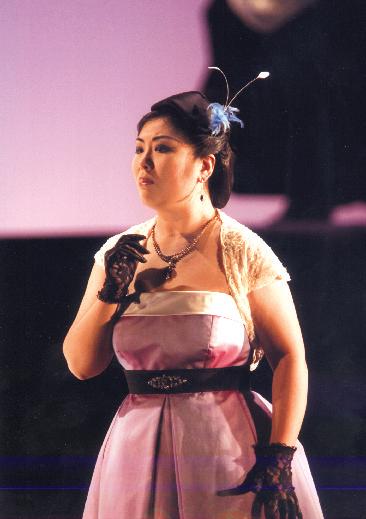
O terrible gift, o cruel gift that an irate heaven made me! You make us so vain and proud, I curse you, I curse you, o beauty! I can only shed my tears, I’ve no hope, I can only suffer! My crime is so horrible that it will never fade!
I curse you, I curse you, o beauty, O my Queen, I sacrificed you to the crazed passion of my heart. Only in a cloister I can now hide my suffering from the world! Alas! Alas! O my Queen, O God! Carlos! tomorrow he will die, O great God! Tomorrow I’ll see him die! Ah! I’ve one day more, there is hope, ah, Heaven be blessed! I’ll save him! One more day, ah, Heaven be blessed! I’ll save him!
啊,發怒的上天賦予我 可怕的才華,殘酷的才華! 你使我們虛榮又傲慢, 我詛咒你,我詛咒你,啊美人! 我惟有流淚, 我沒有希望,我只有痛苦! 我罪孽深重, 再也洗不脫! 我詛咒你,我詛咒你,啊美人! 噢我的皇后,我瘋狂的激情之心 把你犧牲。
只有在修道院 我才能躲開我在世上的痛苦! 唉!唉!我的皇后, 天呀!卡洛斯!明天他就會死! 老天呀!明天我就會看着他死! 啊,還有一天, 我還有希望,啊, 感謝上天!我要救他! 還有一天,啊,感謝上天! 我要救他!
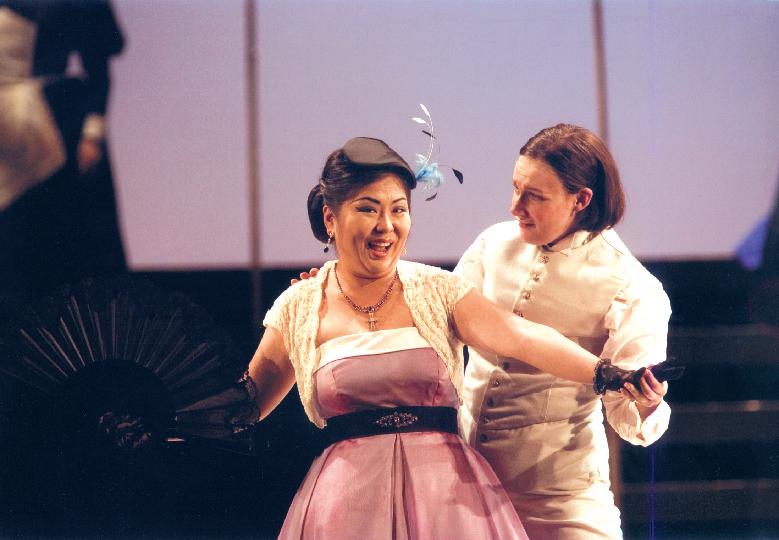
比才
Habanera de Carmen Habanera from Carmen
哈巴內拉舞曲
選自《卡門》
Quand je vous aimerai?
Ma foi, je ne sais pas, peut-être jamais, peut-être demain. mais pas aujourd’hui, c’est certain.
L’amour est un oiseau rebelle que nul ne peut apprivoiser, et c’est bien en vain qu’on l’appelle, s’il lui convient de refuser.
Rien n’y fait, menace ou prière, l’un parle bien, l’autre se tait; et c’est l’autre que je préfère il n’a rien dit; mais il me plaît.
L’amour! L’amour! L’amour! L’amour!
L’amour est enfant de Bohême, il n’a jamais, jamais connu de loi, si tu ne m’aime pas, je t’aime, si je t’aime, prend garde à toi!
Si tu ne m’aime pas, si tu ne m’aime pas, je t’aime!
Mais, si je t’aime, si je t’aime, prend garde à toi!
Si tu ne m’aime pas, si tu ne m’aime pas, je t’aime!
Mais, si je t’aime, si je t’aime, prend garde à toi!
L’oiseau que tu croyais surprendre battit de l’aile et s’envola; l’amour est loin, tu peux l’attendre; tu ne l’attend plus, il est là!
Tout autour de toi vite, vite, il vient, s’en va, puis il revient!
Tu crois le tenir, il t’évite; tu crois l’éviter, il te tient!
L’amour, l’amour, l’amour, l’amour!
L’amour est enfant de Bohême, il n’a jamais, jamais connu de loi, si tu ne m’aime pas, je t’aime, si je t’aime, prend garde à toi!
Si tu ne m’aime pas, je t’aime, si je t’aime, prend garde à toi!
Si tu ne m’aime pas, si tu ne m’aime pas, je t’aime!
Mais, si je t’aime, si je t’aime, prend garde à toi!
Si tu ne m’aime pas, si tu ne m’aime pas, je t’aime!
Mais, si je t’aime, si je t’aime, prend garde à toi!
When will I love you?
Good lord, I don’t know. Maybe never, maybe tomorrow. But not today, that’s certain.
Love is a rebellious bird that nothing can tame, and it is simply in vain to call it if it is convient for it to refuse. Nothing will work, threat or pleading, one speaks, the other stays quiet; and it’s the other that I prefer. He said nothing; but he pleases me. Love! Love! Love! Love!
Love is the child of the Bohemian, it has never, never known any law, if you don’t love me, I love you, if I love you, keep guard of yourself! If you don’t love me, if you don’t love me, I love you! But, if I love you, if I love you, keep guard of yourself! If you don’t love me, if you don’t love me, I love you! But, if I love you, if I love you, keep guard of yourself!
The bird you thought to surprise bat its wing and flew away; love is far away, you can wait for it; if you wait for it no more, it is there! All around you, quickly, quickly, it comes, goes, then it comes back! You think to hold it, it avoids you; you think to avoid it, it holds you! Love, love, love, love!
Love is the child of the Bohemian, it has never, never known any law, if you don’t love me, I love you, if I love you, keep guard of yourself! If you don’t love me, I love you, if I love you, keep guard of yourself! If you don’t love me, if you don’t love me, I love you!
But, if I love you, if I love you, keep guard of yourself! If you don’t love me, if you don’t love me, I love you!
But, if I love you, if I love you, keep guard of yourself!
我什麼時候會愛你? 天呀,我也不知道, 也許永不,也許明天。 但肯定不是今天。
愛情是一隻叛逆的鳥兒, 什麼也馴服不了牠。
如果牠想拒絕就拒絕, 你怎樣呼喚牠也沒用。
你拿牠沒辦法,威脅也罷,懇求也罷, 一個說話,另一個卻沉默, 而我喜歡另一個; 他不說話,而我偏偏喜歡。
愛情!愛情!愛情!愛情! 愛情是一個野孩子, 從來不懂任何規矩,
如果你不愛我,我就愛你, 如果我愛你,那你可要當心! 如果你不愛我, 如果你不愛我,我就愛你! 但如果我愛你, 如果我愛你,那你可要當心! 如果你不愛我, 如果你不愛我,我就愛你! 但如果我愛你, 如果我愛你,那你可要當心! 這隻你覺得奇怪的鳥兒 振翅飛向遠方; 愛情在遠方,你可以等待牠; 如果你不再等待牠,牠就來了! 在你周圍,快快地,快快地, 來了又走了,然後又飛回! 你想抓住牠,牠就避開你; 你想避開牠,牠就抓住你! 愛情,愛情,愛情,愛情! 愛情是一個野孩子, 從來不懂任何規矩, 如果你不愛我,我就愛你, 如果我愛你,那你可要當心! 如果你不愛我,我就愛你, 如果我愛你,那你可要當心! 如果你不愛我, 如果你不愛我,我就愛你! 但如果我愛你, 如果我愛你,那你可要當心! 如果你不愛我, 如果你不愛我,我就愛你! 但如果我愛你, 如果我愛你,那你可要當心!
上海歌劇院交響樂團
指揮 Conductor
張國勇 Zhang Guoyong
團長 Manager
屠虹捷 Tu Hongjie
首席 Concertmaster
陶樂 Tao Le
第一小提琴 1st Violins
王琰婕 Wang Yanjie
菅偉 Jian Wei
吳淑婷 Wu Shuting
袁源 Yuan Yuan
張慧 Zhang Hui
陳陽岳彤 Chen Yang Yuetong
劉莎 Liu Sha
劉星 Liu Xing
石迪迪 Shi Didi
向博 Xiang Bo
王韻 Wang Yun
第二小提琴 2nd Violins
陳新 Chen Xin
把文晶 Ba Wenjing
何傳儒 He Chuanru
鄭詩玉 Zheng Shiyu
唐璟 Tang Jing
金美丹 Jin Meidan
高雨桐 Gao Yutong
高有 Gao You
楊世穎 Yang Shiying
盛貝貝 Sheng Beibei
中提琴 Violas
王楊 Wang Yang
王郁 Wang Yu
郭佳音 Guo Jiayin
劉晨 Liu Chen
姚佳 Yao Jia
袁媛 Yuan Yuan
大提琴 Cellos
王蔚 Wang Wei
解柳佳 Xie Liujia
田崇智 Tian Chongzhi
王榮斌 Wang Rongbin
趙貝倍 Zhao Beibei
董宇清 Dong Yuqing
吳悅 Wu Yue
低音大提琴 Double Basses
潘海峰 Pan Haifeng
趙雲娣 Zhao Yunti
沈雲軒 Shen Yunxuan
朱箏箏 Zhu Zhengzheng
喻業佳 Yu Yejia
長笛 Flutes
費瑄瑄 Fei Xuanxuan
張盛潔 Zhang Shengjie
雙簧管 Oboes
魏後杞 Wei Houqi
王成 Wang Cheng
單簧管 Clarinets
李聰 Li Cong
張利明 Zhang Liming
巴松管 Bassoons
陸偉 Lu Wei
王馨 Wang Xing
小號 Trumpets
吳彬 Wu Bin
車萬轔 Che Wanlin
王學平 Wang Xueping
圓號 French Horns
張揚 Zhang Yang
王鵬 Wang Peng
邵強 Shao Xiang
田耀之 Tian Yaozhi
長號 Trombones
葛勇 Ge Yong
趙竹南 Zhao Zhunan
梁音 Liang Yin
大號 Tuba
陳勤 Chen Qin
敲擊樂 Percussion
周建華 Zhou Jianhua
黎光 Li Guang
蔡永明 Cai Yongming
豎琴 Harp
關玲 Guan Ling